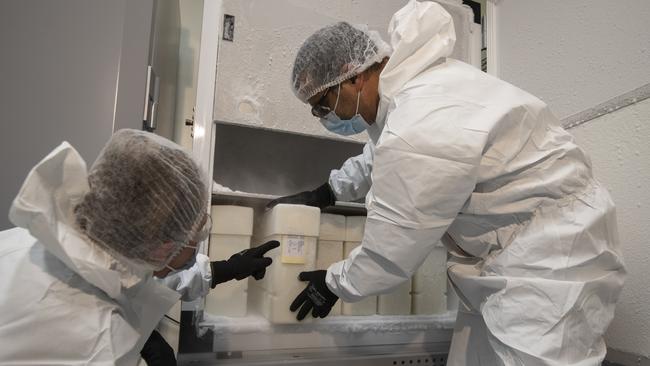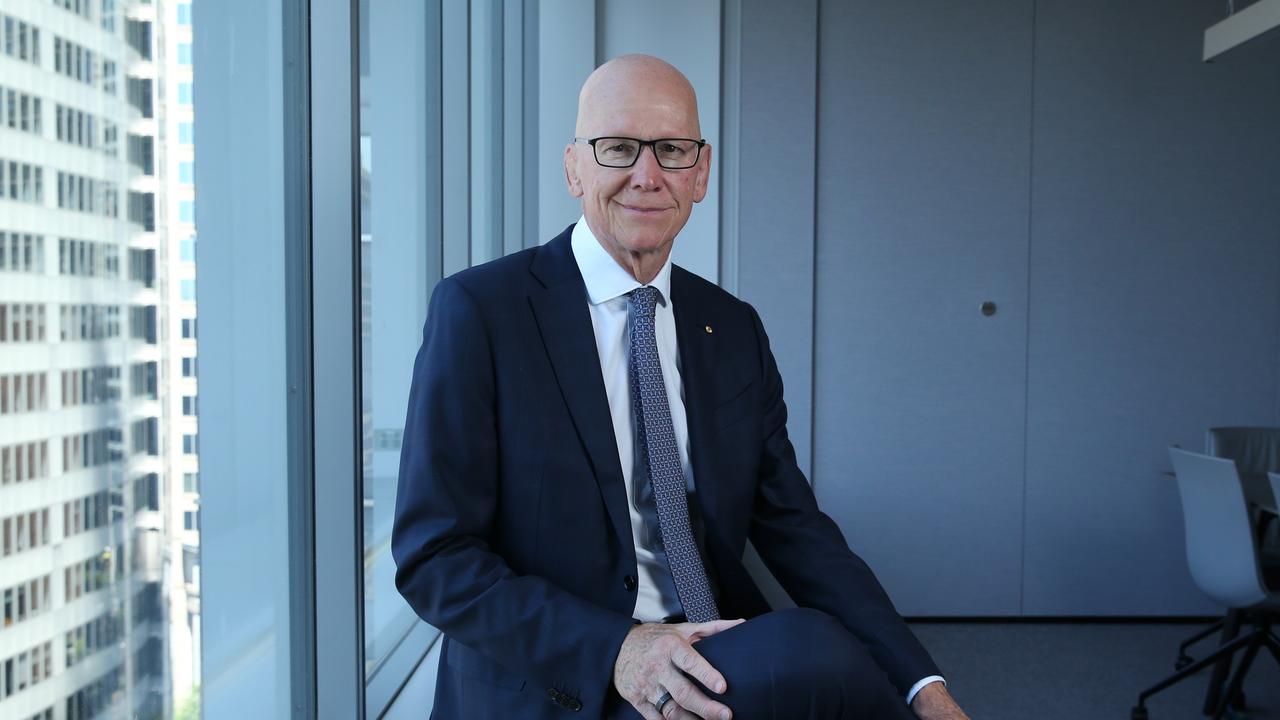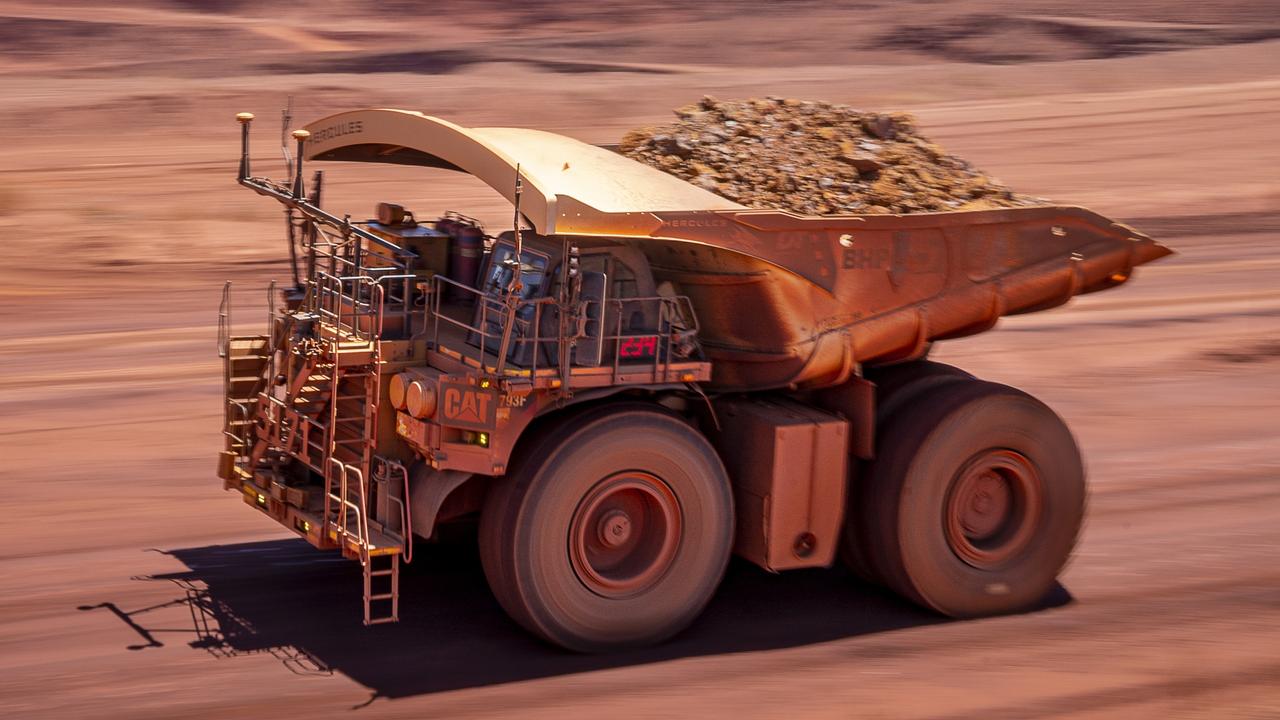CSL to deliver one million Australian-manufactured COVID-19 vaccines a week from the end of March
CSL has brought forward the delivery of the first doses of an Australian manufactured COVID-19 vaccine as the European Union threatens to block exports.

Business
Don't miss out on the headlines from Business. Followed categories will be added to My News.
CSL, the nation’s biggest health company, has brought forward its first delivery of an Australian-produced COVID-19 vaccine, confirming it is on track to provide the federal government with a million doses a week by the end of next month.
CSL had scheduled to deliver its first of more than 50 million doses sometime during the second quarter of this year. But production is humming along at its factory at Broadmeadows, in Melbourne’s north, so much so that delivery will now only be three weeks behind the start of the government’s COVID-19 immunisation program.
The news comes as Health Minister Greg Hunt has played down fears of a potential delay of 3.8 million doses of an AstraZeneca coronavirus vaccine — known as AZD1222 and the same type CSL is producing under licence — that are expected to arrive from Europe before the end of this month.
This is despite Australia not being among the countries exempted from the EU’s threat to ban exports of AstraZeneca’s vaccine amid production problems at AstraZeneca’s plant in Belgium and claims the UK has “hijacked” doses of the vaccine produced in Brussels.
Still, preparations are gathering pace for the Australian rollout. Pharmacists are ready to start administering the first jabs by early March after Mr Hunt confirmed they would be part of the immunisation program.
A CSL spokeswoman said the company was also on track to begin a process known as fill and finish — or preparing bulk vaccine product into vials ready for inoculation — in the next two weeks.
“We remain on track with our timelines and expect ‘fill and finish’ to commence in the middle of February with first doses of the AstraZeneca vaccine — tested, approved and released by the TGA (Therapeutic Goods Administration) — from late March,” she said.
“CSL is working hand-in-hand with AstraZeneca and the TGA to have the AZD1222 vaccine manufactured and delivered to Australians as quickly as possible, without compromising the safety or quality of the vaccine,” the CSL spokeswoman added.
AstraZeneca hit a hurdle at its European operations after it found yields varying among its various manufacturing partners. It has since been working to boost production where it has been lagging.
CSL on Friday said it had experienced initial problems growing the cell culture to manufacture the 50 million doses onshore but it had overcome those. It was not unusual to experience yield variation when manufacturing a new type of vaccine.
“Vaccine manufacture is highly complex and it is not unusual to experience variations in yield levels in the initial product manufacturing runs, particularly for a new vaccine,” the CSL spokeswoman said.
“In consultation with AstraZeneca we have leveraged our deep expertise in vaccine development and recombinant drug manufacture to optimise the AZD1222 manufacturing process and achieve higher yields for each batch.”
The AstraZeneca vaccine will form the bulk of the government’s $3.3bn COVID-19 immunisation program, which has secured four types of vaccines. Under its agreement with the pharmaceutical giant, the government had arranged to import 3.8 million doses of the AstraZeneca vaccine from Europe to cover the gap between the start of its COVID-19 immunisation program and the delivery of the locally produced vaccine doses.
CSL received $300m from the government to retool to produce the formulation that AstraZeneca developed with Oxford University, and a separate type of COVID-19 vaccine from University of Queensland. That vaccine failed in December.
CSL began producing the AstraZeneca vaccine under licence in November and said last month it had been working “around the clock” to complete the first bulk batches, which were undergoing “extensive quality control tests”. After testing is completed, the bulk vaccine product will be filled into individual vials at the factory of influenza vaccine business Seqirus in Melbourne.
Mr Hunt said Australia’s vaccine rollout remained on track despite the EU planning to restrict the export of Pfizer and AstraZeneca jabs. Last week the European Commission began hoarding the vaccines for 450 million Europeans after claiming the UK had “hijacked’’ doses of the AstraZeneca vaccine made in a Brussels plant.
But Mr Hunt said Europe’s threats to restrict vaccine exports were not aimed at Australia.
On Monday he invited community pharmacies to help administer the vaccine via an expression of interest process, in what he said would be one of the “largest logistical operations in our country’s history”.
“Using the existing network of thousands of community pharmacies will ensure the general population have broader access to COVID-19 vaccinations, provide choice in where the community receive a vaccine, and address barriers to access some parts of rural and regional Australia,” Mr Hunt said.
“Participation in the program will be voluntary and pharmacies will need to demonstrate they meet the highest safety standards and have capacity and capability to deliver COVID-19 vaccines, as well as ensuring they continue to provide important services to their local communities.”
Mark Hooper, chief executive of Sigma Healthcare — the nation’s biggest pharmaceutical wholesaler and owner of the Amcal, Guardian and other chemist brands — said pharmacists across the country were ready to help administer the vaccine.
He said for many years pharmacies had administered seasonal influenza vaccines and their role in supporting the COVID-19 inoculation effort would help ease the burden on GP clinics.
“If you think about it, if there are 40-60 million vaccine doses that have got to be delivered over the next six to nine months, asking the GP network to absorb all of that would just completely overwork that network,” Mr Hooper said.
“The pharmacy network has been administering the flu vaccine safely for some time now. There would be separate accreditation and training for the rollout of the COVID vaccine.
“Using the pharmacy network to supplement the GPs makes perfect sense and just gives us the best chance of getting the Australian population inoculated safely and quickly.”
In addition to the 53.8 million doses of the AstraZeneca vaccine, the government has contracted to buy 51 million doses of the American Novavax vaccine and 10 million doses of the Pfizer-BioNTech vaccine given emergency-use authorisation by US and British regulators.
Mr Hooper expected that pharmacists would administer the AstraZeneca vaccine, given it can be stored at similar temperatures to regular vaccines, unlike the Pfizer vaccine, which must be stored at temperatures as low as -70C.
More Coverage
Originally published as CSL to deliver one million Australian-manufactured COVID-19 vaccines a week from the end of March





